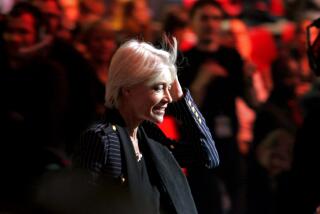Rene Hardy; Frenchman Haunted by Suspicions
- Share via
NIORT, France — Rene Hardy, a French author who was a hero of the World War II Resistance to some and the betrayer of that Resistance’s leader to others, has died, officials at a hospice in nearby Melle announced Tuesday.
Hardy, who led a reclusive life for years, died Sunday night at the age of 75, officials at the hospice said. They did not give the cause of death. Hardy had been hospitalized since 1984 in Melle, about 18 miles from Niort.
Twice acquitted of informing on several underground figures, including the chief of the Resistance, Jean Moulin, Hardy never lived down suspicions by some war veterans and historians that he provided the Gestapo with information leading to Moulin’s capture, torture and eventual death.
A prolific author, Hardy was awarded the Deux Magots literary prize for his 1956 book “Amere Victoire” (Bitter Victory). His “Derniers Mots” (Last Words), published in 1984, revived charges and counter-charges about Hardy’s role in the Resistance.
As a boy Hardy studied at a railroad school and worked on France’s state-run train system until 1939.
In 1940, with the war under way, Hardy organized a network called “Iron Resistance” which specialized in sabotaging railroads during Nazi Germany’s occupation of France.
Hardy was imprisoned in Toulon by Vichy authorities from 1941 to 1942 but resumed his Resistance work when freed.
Hardy was arrested again on June 7, 1943, during a train trip from Lyon to Paris, and allegedly betrayed Moulin, head of the French Resistance, during interrogation by Lyon Gestapo Chief Klaus Barbie.
In the book, “Klaus Barbie, Butcher of Lyon” by Tom Bower, Barbie claimed that Hardy agreed to collaborate. Barbie himself goes on trial in Lyon for war crimes on May 11.
After his release, Hardy was wounded but fled from a Lyon hospital, taking refuge in Algiers in 1944. He returned to Paris after the liberation, and at two trials, in 1947 and 1950, was acquitted of collaborating.
In one of the rare interviews accorded during his three years in in Melle, Hardy told a French reporter, “You will see. People will be fighting (about the charges) even over my dead body.”
More to Read
Sign up for our Book Club newsletter
Get the latest news, events and more from the Los Angeles Times Book Club, and help us get L.A. reading and talking.
You may occasionally receive promotional content from the Los Angeles Times.







